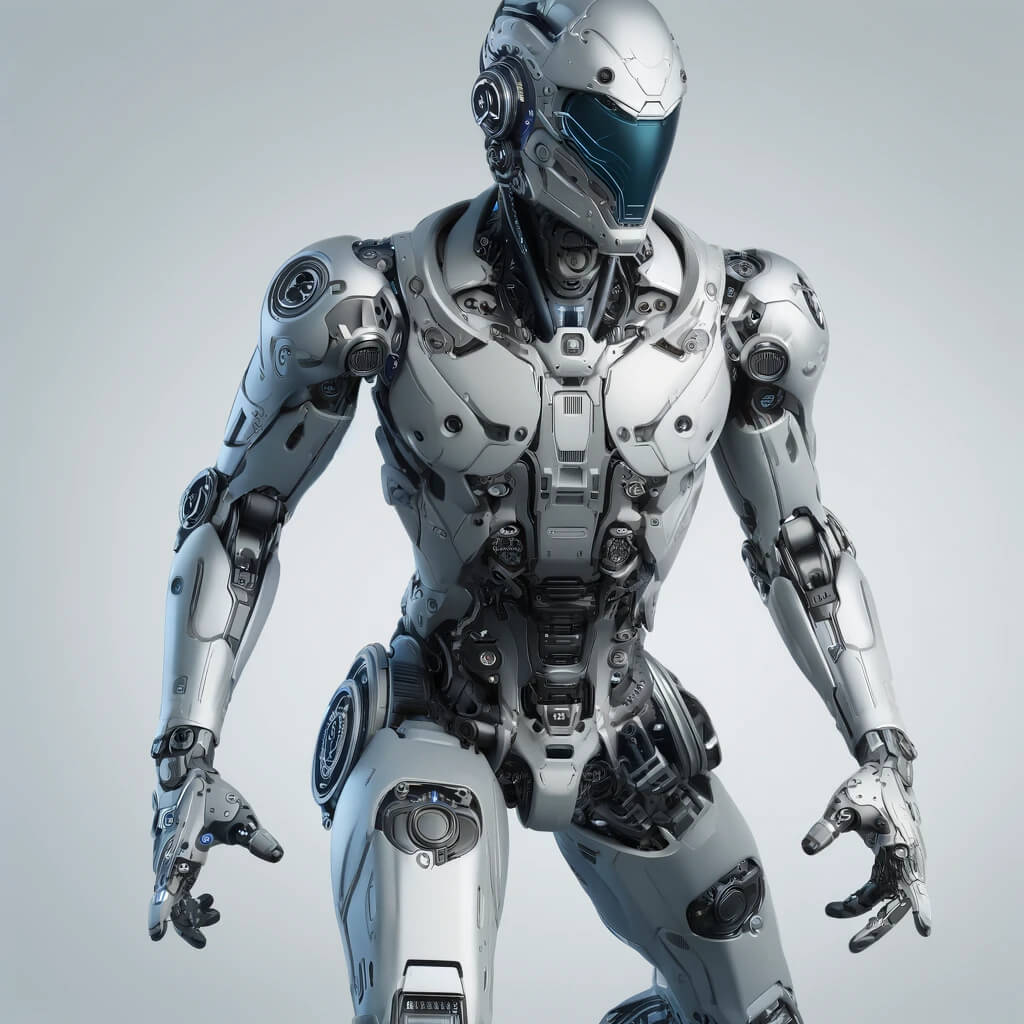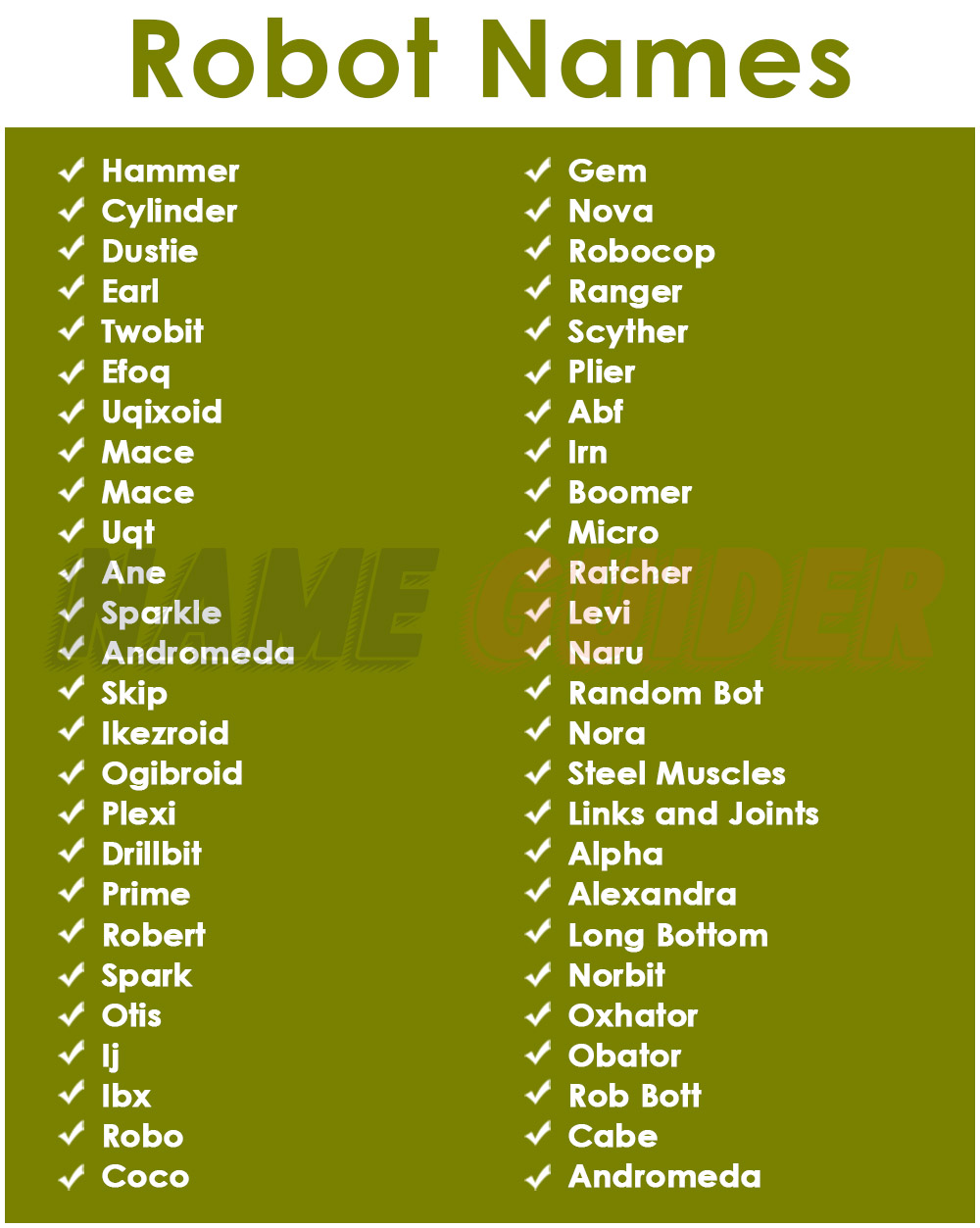Unveiling The Fascinating World Of Robot Name: The Future Of Innovation In Robotics
Apr 18 2025
Ever wondered how a robot gets its name? It's more than just a label; it's an identity that shapes perception, functionality, and even our interaction with these futuristic machines. In today’s rapidly advancing world, the concept of a robot name plays a pivotal role in bridging the gap between humans and technology. As we delve deeper into this topic, you'll discover how robot names aren't random but carefully crafted to reflect purpose, design, and innovation.
Let’s be real here, naming a robot isn’t like naming your pet dog or your favorite coffee mug. There's a whole science behind it. The name can signify the robot's role, its capabilities, or even pay homage to historical figures who've contributed to robotics. It’s not just about creating a catchy phrase; it’s about crafting an identity that resonates with both developers and users alike.
As we explore the intricacies of robot names, we’ll uncover the methods behind the madness, the significance of these names in various industries, and how they influence the perception of robots in our daily lives. So, buckle up and get ready to dive into the exciting realm of robot naming conventions.
Read also:Steve Ross Painter Net Worth The Untold Story Of A Visionary Artist
What Exactly is a Robot Name?
In the simplest terms, a robot name is the identifier assigned to a robotic entity. But let's not kid ourselves, it’s far from simple. These names often encapsulate the essence of the robot’s purpose, design, and functionality. For instance, a robot designed for space exploration might have a name that reflects its adventurous spirit and scientific mission, like "Rover" or "Explorer."
Moreover, robot names can also serve as a marketing tool, making the robot more relatable and approachable to the general public. Think about it, would you rather interact with a machine called "Unit 42" or one named "Buddy"? The latter sounds way more inviting, doesn’t it? This is why companies investing in robotics spend significant time and resources on naming their creations, ensuring they resonate well with their target audience.
Why Does a Robot Need a Name?
Now, you might be wondering, why bother naming a robot at all? Well, here’s the thing: names give robots personality. They transform a piece of machinery into something almost human-like, making interactions more natural and intuitive. A well-chosen name can evoke emotions, create connections, and even enhance user experience.
Plus, in industries where robots work alongside humans, having a name can simplify communication. Imagine a factory floor where robots are part of the team. Calling out "Arm-345" every time you need assistance isn’t exactly efficient. A name like "Sam" or "Jane" makes the interaction smoother and more personal.
Key Benefits of Naming Robots
- Enhanced User Interaction: Names make robots more relatable and approachable.
- Improved Communication: Simplifies interaction in collaborative environments.
- Brand Identity: Helps companies establish a unique identity for their robotic products.
- Marketing Advantage: A catchy name can boost product appeal and recognition.
How Are Robot Names Chosen?
Choosing the right name for a robot is no small feat. It involves a combination of creativity, research, and strategic thinking. Developers often consider several factors before finalizing a name, including the robot’s purpose, target audience, and cultural implications.
For example, robots designed for educational purposes might have names that inspire curiosity and learning, such as "EduBot" or "LearnSphere." On the other hand, robots built for security might have names that convey strength and reliability, like "Guardian" or "Protector." The key is to ensure the name aligns with the robot’s intended function and resonates with its users.
Read also:Phone Numbers To Call When Bored Fun Safe And Totally Legal Entertainment
Factors Influencing Robot Naming
- Purpose: The primary function of the robot.
- Audience: The demographic the robot is designed to serve.
- Culture: Ensuring the name is culturally sensitive and universally appealing.
- Brand Alignment: Reflecting the company’s values and mission.
The Evolution of Robot Names Over Time
Back in the day, robots were often given technical, alphanumeric names that reflected their serial numbers or model types. Fast forward to today, and we see a shift towards more creative and meaningful names. This evolution mirrors the growing importance of robotics in our daily lives and the need to humanize these machines.
Take, for example, the evolution of names in the automotive industry. From "Assembly Bot 1.0" to "Sparky," the progression shows how manufacturers are moving away from sterile, technical labels towards names that evoke emotion and connection.
Historical Examples of Robot Names
- Asimo: Honda’s humanoid robot, named after the famous science fiction writer Isaac Asimov.
- R2-D2: A pop culture icon from Star Wars, showcasing the potential of creative robot names.
- Da Vinci Surgical System: Named after the renowned inventor and artist, Leonardo da Vinci.
Robot Name Trends Across Industries
Every industry has its own set of trends when it comes to naming robots. In healthcare, names often reflect precision and care, such as "Mira" or "HealBot." In entertainment, robots are given names that spark imagination and excitement, like "Optimus Prime" or "Baymax." Meanwhile, in manufacturing, names tend to emphasize efficiency and reliability, such as "Cobra" or "Titan."
Understanding these trends can help developers create names that not only resonate with their industry but also stand out in a crowded market.
Industry-Specific Naming Examples
- Healthcare: "Mira," "HealBot."
- Entertainment: "Optimus Prime," "Baymax."
- Manufacturing: "Cobra," "Titan."
The Psychology Behind Robot Names
Names have a powerful psychological impact on how we perceive things, and robots are no exception. A well-chosen name can influence our expectations, emotions, and even our willingness to interact with a robot. For instance, a name like "Angelina" might make us feel more comfortable receiving care from a robotic nurse, while a name like "Terminator" might evoke fear or caution.
Psychologists suggest that names can also shape our behavior towards robots. If a robot has a friendly-sounding name, we might be more inclined to trust it and engage with it. Conversely, a name that sounds cold or impersonal might deter us from forming a connection.
The Role of Robot Names in Human-Robot Interaction
In the realm of human-robot interaction (HRI), names play a crucial role in facilitating communication and collaboration. They help bridge the gap between humans and machines, making interactions more natural and intuitive. Whether it’s a robot assistant in the office or a companion robot at home, having a name makes the experience more personal and engaging.
Studies have shown that people tend to anthropomorphize robots with names, attributing human-like qualities to them. This can enhance trust and acceptance, making robots more effective in their roles.
Best Practices for Naming Robots
- Be Memorable: Choose a name that sticks in people’s minds.
- Be Relevant: Ensure the name aligns with the robot’s purpose and function.
- Be Unique: Avoid generic names that could be confused with other products.
- Be Culturally Sensitive: Consider the global audience and avoid names that could be offensive.
Challenges in Naming Robots
While naming robots might seem straightforward, it comes with its own set of challenges. One major hurdle is avoiding trademark conflicts. With so many robots being developed worldwide, coming up with a unique name that hasn’t already been taken can be tricky. Additionally, developers must ensure the name doesn’t have negative connotations in different languages or cultures.
Another challenge is balancing creativity with functionality. A name that sounds too outlandish might not be taken seriously, while one that’s too technical might alienate potential users. Striking the right balance requires careful consideration and testing.
Future Trends in Robot Naming
Looking ahead, the future of robot naming is likely to become even more innovative and diverse. As robots become more integrated into our daily lives, names will play an increasingly important role in shaping our perception of them. We might see more personalized naming options, where users can choose or customize the name of their robot companion.
Additionally, advancements in AI and machine learning could lead to robots that suggest their own names based on interactions and experiences. Imagine a robot that evolves its name as it learns more about you and your preferences. The possibilities are endless!
Predictions for Upcoming Naming Trends
- Personalization: Users will have more input in naming their robots.
- AI-Driven Naming: Robots suggesting names based on interactions.
- Cross-Cultural Names: Names that appeal universally across different cultures.
Conclusion: The Power of a Name in Robotics
In conclusion, the importance of a robot name cannot be overstated. It’s more than just a label; it’s a crucial element that shapes perception, interaction, and acceptance of these incredible machines. As we continue to advance in the field of robotics, the art and science of naming robots will undoubtedly evolve, offering new opportunities for creativity and connection.
So, the next time you encounter a robot, take a moment to appreciate the thought and effort that went into naming it. And if you’re involved in robotics, remember that a well-chosen name can make all the difference in how your creation is perceived and embraced by the world.
Now it’s your turn! Share your thoughts in the comments below. Do you have any favorite robot names? Or perhaps you have ideas for naming your future robot companion? Let’s keep the conversation going and explore the fascinating world of robot names together!
Table of Contents
- What Exactly is a Robot Name?
- Why Does a Robot Need a Name?
- How Are Robot Names Chosen?
- The Evolution of Robot Names Over Time
- Robot Name Trends Across Industries
- The Psychology Behind Robot Names
- The Role of Robot Names in Human-Robot Interaction
- Challenges in Naming Robots
- Future Trends in Robot Naming
- Conclusion


